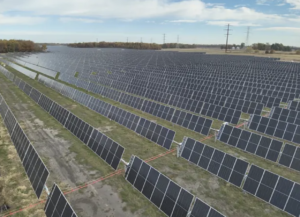FirstEnergy Solutions (FES) said it will close the Bruce Mansfield power plant in Pennsylvania in November, two years ahead of the previously scheduled closure for the facility’s remaining coal-fired unit.
FES in a statement August 9 cited a “lack of economic viability in current market conditions” for the decision to shutter the 830-MW Unit 3, which had been set to close in June 2021. Units 1 and 2 at the plant, each with 830 MW of generation capacity, were taken offline in February, just more than a year after a fire at the plant damaged equipment. Those units also had been scheduled to close in June 2021.
FES in a press release Friday said “deactivation activities” at Bruce Mansfield should be complete by May 2020. The group filed for bankruptcy in March 2018, as the company sought an “orderly financial restructuring.” FES at the time said both its coal-fired and nuclear power plants in Ohio and Pennsylvania were unprofitable.
Company officials in a statement Friday said, “The [Bruce Mansfield] deactivation will be safely and responsibly conducted in accordance with relevant regulations and guidelines. By November, the workforce will be reduced to a level required to complete deactivation activities. In all cases, the company will comply with its collective bargaining agreement, including severance as applicable, and have already initiated discussions with union leadership.”
The International Brotherhood of Electrical Workers Local 272, the union which represents 230 workers at Bruce Mansfield, in July won a case in federal court against FES that could yield about $5.5 million in back wages for workers. The union had said FES unilaterally imposed working conditions at the plant after contract negotiations broke down. FES has said it is reviewing that decision, and said any payments would need approval from the bankruptcy court.
The company’s reorganization plan is scheduled to be heard by a bankruptcy judge this month. The same judge earlier this year said the plan, which includes broad releases of liability for FirstEnergy Corp., the parent of FES, is “patently unconfirmable.” FirstEnergy Corp. is not a debtor in the bankruptcy.
Groups Assail Reorganization Plan
FES’s latest reorganization plan was filed July 23. Several groups, including the U.S. government, immediately objected to the plan. There are concerns that FES will not be able to pay for decommissioning work at plants it plans to close. The federal government said the plan also could preclude its agencies from seeking future damages.
Unions that represent workers at FES’s nuclear plants also expressed opposition to the plan, noting the company does not want to honor existing labor contracts, and instead wants to renegotiate them after it emerges from bankruptcy.
FES last year filed for bankruptcy just days after telling PJM Interconnection that it planned to close three uneconomic nuclear plants in the regional transmission organization’s footprint: the 908-MW Davis-Besse Nuclear Power Station in Oak Harbor, Ohio, by 2020; the twin-unit 1,872-MW Beaver Valley Power Station in Shippingport, Pennsylvania, in 2021; and the 1,268-MW Perry Nuclear Power Plant in Perry, Ohio, in 2021.
The group also filed an application for an emergency order with the Department of Energy under Section 202(c) of the Federal Power Act, asking Energy Secretary Rick Perry to “find an emergency condition exists” in PJM’s region, and to force PJM to compensate at-risk merchant nuclear and coal plants to maintain grid stability.
Bailout for Ohio Nuclear Plants
Ohio lawmakers in July approved a bailout for the Davis-Besse and Perry nuclear plants, amounting to about $150 million annually. FES immediately rescinded its deactivation requests for those two plants. The company is seeking similar support in Pennsylvania, where Beaver Valley is still scheduled to be closed, although its operating license does not expire until 2047. Some third-party studies, including one from PJM, have shown Beaver Valley is a profitable plant, but a spokesperson for FES last week said the company “is not considering a change in status for Beaver Valley.”
Other states also have passed legislation to prop up uneconomic nuclear generation, with some states still considering bailout options.
West Virginia lawmakers, meanwhile, in July passed a bill that will give a $12 million tax cut to FES’s 1,300-MW coal-fired Pleasants Power Station in that state. The legislation exempts the plant from paying the state Business and Occupation (B&O) tax for merchant power plants, or sites that sell electricity to wholesalers and not to retail customers.
The Pleasants Power Station is one of only two coal-fired merchant plants in West Virginia, and the only merchant power plant paying the B&O tax. There are eight major coal-fired power plants in West Virginia. The six non-merchant plants are regulated by the West Virginia Public Service Commission.
The Pleasants Power Station is scheduled to remain in operation until at least mid-2022, according to a bankruptcy agreement made last year with FES’s creditors.
—Darrell Proctor is a POWER associate editor (@DarrellProctor1, @POWERmagazine).










